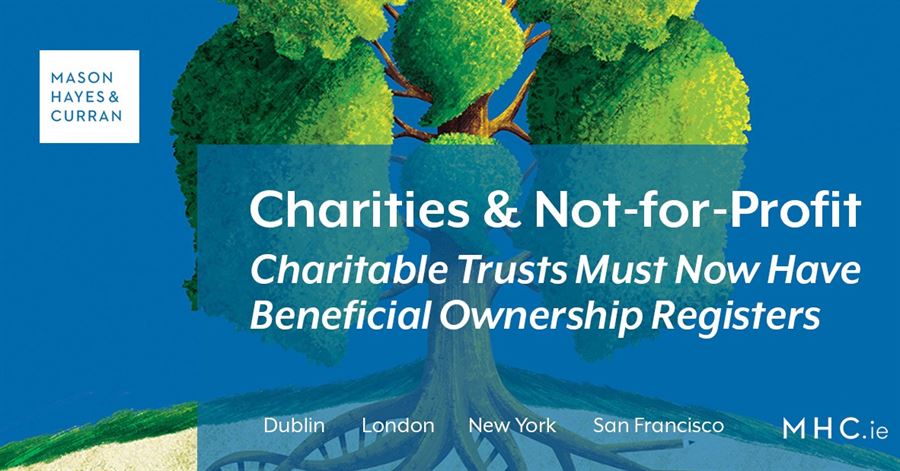
The European Union (Anti-Money Laundering: Beneficial Ownership of Trusts) Regulations 2019 came into force on 29 January 2019. They apply to any trust whose trustees are resident in the State or which is otherwise administered in the State. If you are a trustee of a trust which meets this description, including a charity trustee of a charitable trust, you are now required to establish and maintain information about the charity’s “beneficial owners” in a beneficial ownership register.
Who is a “beneficial owner”?
The “beneficial owners” are the natural persons who ultimately own or control the trust and/or the natural persons on whose behalf a transaction or activity is being conducted. For a trust, the beneficial owners include:
- The settlor
- The trustees
- The protector, if any
- The beneficiaries, or where the beneficiaries have yet to be determined, the class of persons in whose main interest the trust is set up or operates, and
- Any other natural person exercising ultimate control over the trust by means of direct or indirect ownership or by other means
It will often be straightforward to identify the trustees of a trust. However, it may be more difficult to identify the beneficiaries, particularly if the trust is charitable. When drafting the Register, careful consideration will have to be given by the trustees to the description of the “class of persons” in whose interest the trust carries out its activities.
What details must the Register contain?
All trustees must take reasonable steps to obtain and hold “adequate, accurate and current” information in relation to the trust’s beneficial owners. This includes the following information:
- Name
- Date of birth
- Nationality
- Residential address
- Date the beneficial owner was first added to the Register, and
- Date of cessation of beneficial ownership
The trustees of a trust are required to keep this information up-to-date. In addition, trustees are required to keep records of the steps that they have taken to identify the beneficial owners of the trust. These records must be retained for at least 5 years after all funds in the trust are distributed.
In addition, if the trustees of a trust (acting in that capacity) enter into an “occasional transaction” with a “designated person” or form a business relationship with a designated person then the trustees must notify the designated persons that they are acting as trustee and, on request, provide them with the information identifying all the beneficial owners of the trust.
The trustees must also notify the designated person of any changes to the beneficial owners of the trust within 14 days of any change. A designated person is defined under section 25 of the Criminal Justice (Money Laundering and Terrorist Financing) Act 2010 and includes credit institutions, banks, accountants and solicitors. An occasional transaction is a transaction for which a designated person must apply customer due diligence.
Disclosure of information on the Register
The Regulations contain an obligation on the part of trustees to provide access to a trust’s Register to the Revenue Commissioners, or any State competent authority, including the Central Bank, the Minister for Justice and Equality etc., upon request.
Sanctions
Criminal sanctions apply for breach of the Regulations. Therefore, if you are a trustee of a trust which falls within the scope of the Regulations, it is imperative that you understand how to meet the requirements of the Regulations and take immediate steps to establish your Register.
Conclusion
The obligation to establish and maintain a Register is a current, live obligation for all trusts which have trustees resident in the State or are otherwise administered here, including charitable trusts. If you are a trustee of such a trust, this obligation rests on you. Therefore, it is important that you take steps to establish your trust’s Register as soon as possible.
For charitable trusts, the identification of the “beneficial owners” may not be as straightforward as for other trusts. Therefore, the trustees should carefully consider what steps they need to take to ensure that they meet all of their obligations in a manner that is fully compliant with the Regulations.
If you require assistance as you commence the process of establishing a Register for your trust, contact a member of our Charity & Not-for-Profit team.
The content of this article is provided for information purposes only and does not constitute legal or other advice.



